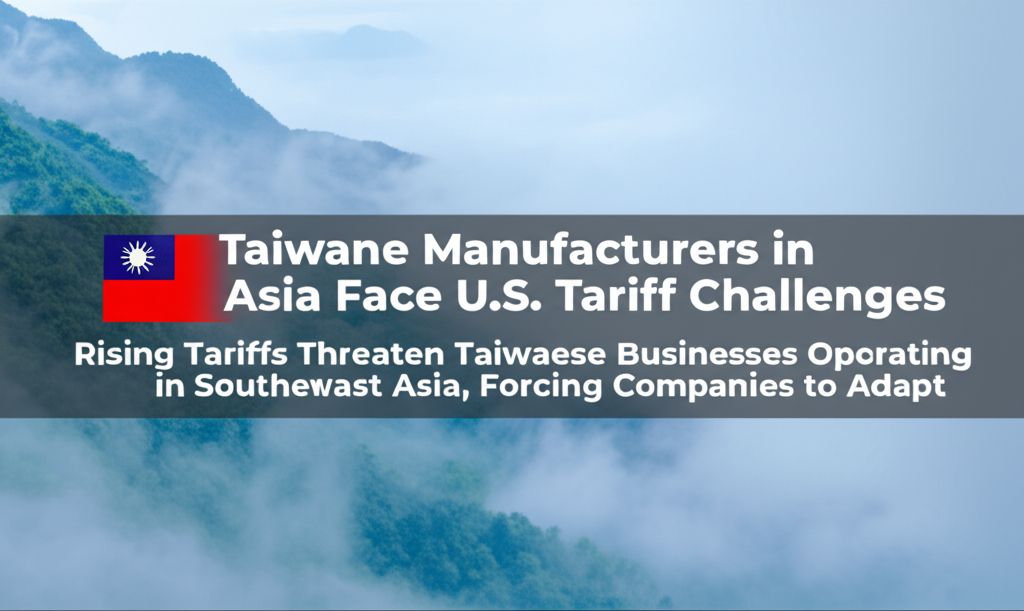Taiwanese Manufacturers in Southeast Asia Face U.S. Tariff Challenges
Rising Tariffs Threaten Taiwanese Businesses Operating in Southeast Asia, Forcing Companies to Adapt

Taipei, April 5 – Taiwanese businesses with significant manufacturing presence in Southeast Asia are expressing concern over the latest U.S. tariffs, which are poised to impact their operations and profitability. These companies, critical players in global supply chains, are now navigating a complex landscape of increased costs and market uncertainty.
Eclat Textile Co., a Taiwanese supplier to major international sportswear brands like Nike, Lululemon, and Under Armour, revealed that 60% of its garment sales come from the U.S. market. The company, with 60% of its production in Vietnam, 27% in Indonesia, and 10% in Cambodia, faces significant risks due to the new tariffs.
U.S. President Donald Trump's announcement of reciprocal tariffs on countries worldwide, ranging from 10% to over 40%, effective from April 9, has sent ripples of concern through the Taiwanese business community. The imposed tariffs include 32% on Taiwan, 34% on China, 49% on Cambodia, 46% on Vietnam, 36% on Thailand, and 32% on Indonesia.
Eclat Textile acknowledged that, even with its diversified production bases, it cannot fully escape the consequences of the new tariffs. The company plans to collaborate closely with its suppliers to enhance production efficiency, aiming to control costs. Furthermore, Eclat intends to establish strategic partnerships with its clients as a strategy to mitigate the impact of the Trump administration's policies.
While some Taiwanese companies are considering investment in the U.S. to circumvent the tariffs, Eclat believes it will be challenging for the textile industry to expand production in the U.S. due to high labor costs and potential supplier shortages.
Makalot Industrial Co., a manufacturer of garments such as pants, underwear, and sleepwear, also voiced apprehension about the financial impact of Trump's tariffs on Southeast Asian countries. The U.S. accounts for over 70% of Makalot's total sales revenue. With 41% of its production in Indonesia, 37% in Vietnam, and 14% in Cambodia, the company is feeling the pressure.
Makalot is planning international meetings next week to discuss with its clients how to share the anticipated financial burden resulting from the latest U.S. tariffs.
Pou Chen Corp., a leading Taiwanese footwear manufacturer and a contract supplier to major international brands like Nike, Adidas, and New Balance, is also concerned. Pou Chen, with 53% of its production in Indonesia and over 30% in Vietnam, is preparing for discussions with its clients to strategize a response to the tariffs.
Beyond the textile industry, other Taiwanese firms, including furniture manufacturers Shane Global Holding Inc. and Nien Made Enterprise Co., are also bracing for the tariff impacts. Shane Global has 64% of its production in China and Cambodia, while Nien Made has 80% of its production in those two countries, according to market estimates.
Several Taiwanese companies in the tech sector also have large production lines in Southeast Asian countries.
In response to the situation, Taiwan's National Development Council (NDC), the top economic planning body, announced on Friday that it will offer assistance to Taiwanese manufacturers in Southeast Asia seeking to return to Taiwan.
NDC head Liu Chin-ching (劉鏡清) stated that the government will work to optimize Taiwan's investment environment to bolster the global competitiveness of Taiwanese companies.
